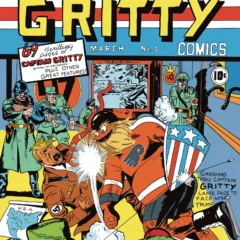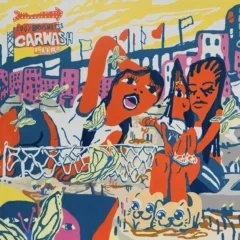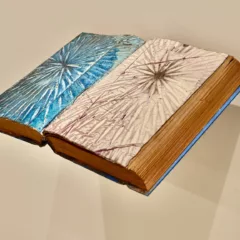[Recognizing Gregory Prestegord’s masterful ability to suspend viewers in a given moment, Rachel reviews the oil painter’s work on view at F.A.N. Gallery. — the Artblog editors]
Gregory Prestegord’s paintings will resonate with anyone who experienced the past winter in Philadelphia. He captures the heaviness of snow’s blanketing, the loneliness in the streets as the city’s inhabitants remain forced inside; the endlessness; the constant.
City scenes described in oils
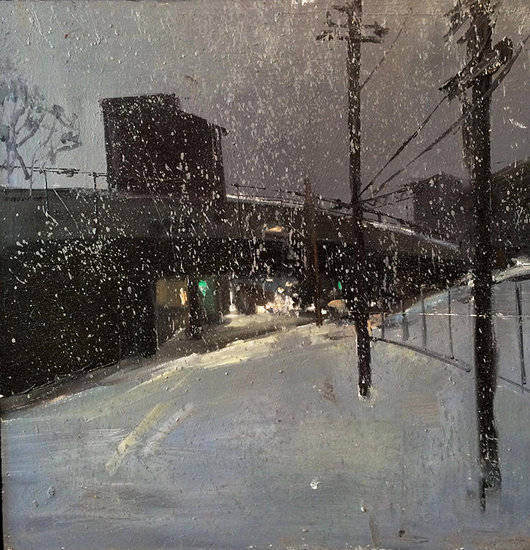
If there is one painter capturing Philadelphia today, it is Gregory Prestegord.
I first met Prestegord last year after wandering into F.A.N. Gallery in Old City. His pieces combined a sense of stillness with frenzy–and yet the subject matter was instantly recognizable. The compositions felt like documentary photographs–capturing architecture’s beauty and deterioration–but also possessing the city’s energy and endurance. I was particularly struck by a painting depicting a small, run-down church located on Callowhill and 9th Streets. I used to pass the church frequently, stopping to admire the light against the colored glass. Prestegord had captured the structure’s elegance, without demeaning its abandonment. Months later, the church was demolished.
In his latest showing of paintings at F.A.N., Prestegord again captures Philadelphia’s urban life. His paintings are markedly familiar–transporting us to that one corner in Chinatown, that strip of storefronts in the Italian Market, that overpass. And yet for those who do not call Philadelphia home, the sites are still remarkably intimate, filled with characteristics of old American industrial cities: brick, steel, electrical lines, concrete.

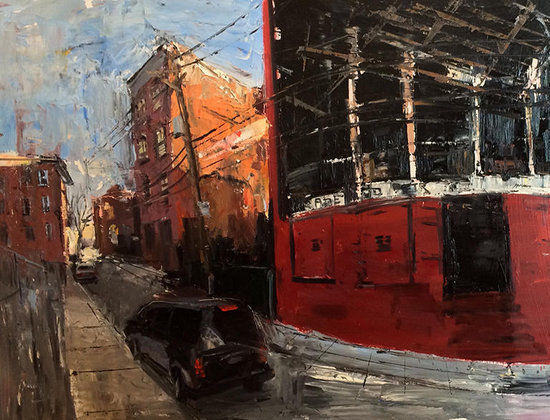
Raised in Philadelphia’s arts tradition
No stranger to Philadelphia’s cultural scene, Prestegord built scaffolding and participated in mural projects in the early years of Philadelphia Mural Arts. He later studied at the Pennsylvania Academy of Fine Arts (PAFA). Though a young artist, Prestegord embodies an older era of painting–one focused on observation, practice, and sight. One can see the influence of Impressionism and Ashcan artists on his work–the grittiness of the subject matter intertwined with the graceful energy of the paint strokes–but he brings these genres into the contemporary, using oil painting techniques in a manner that is at once relevant, elevated, and surprising.
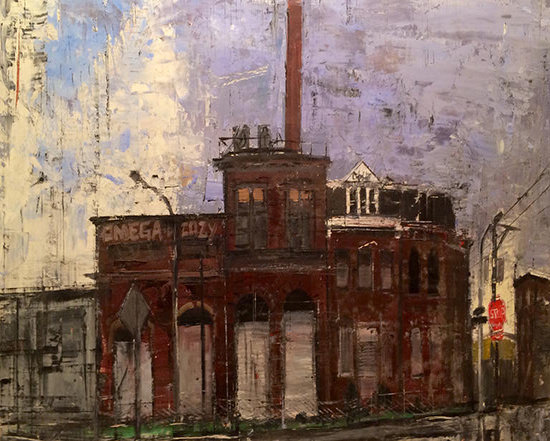
Painting predominately with a palette knife, Prestegord digs through the mundanity of the everyday and remains inspired by the streets he has always walked. Indeed, he is a master of the street-scape, seamlessly combining representation with expressionism. He rarely fails at capturing the kinetic energy of moments dictated by the instability of the weather, the mood of an evening’s light, and the consistency of architecture’s stillness. Within these captured environments, the details seep through: the pop of graffiti, smokestacks, traffic signs, stoplights.
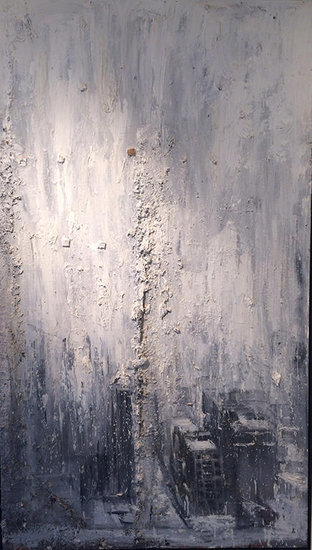
This energy is also replicated in his painting process, in which the materials themselves provide an added element of grittiness. Some works have burned edges, sawtooth marks from the removal of layers of frames, or splinters from the found wood on which Prestegord paints many pieces. One of the most striking works in the show, “Abstract Snow Storm,” is painted on Prestegord’s old palette–the center of the composition marked by a hefty chunk of dried paint that adds to the storm’s heaviness.
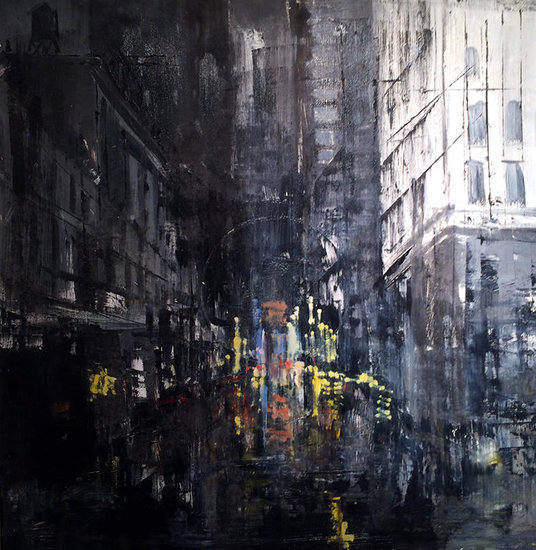
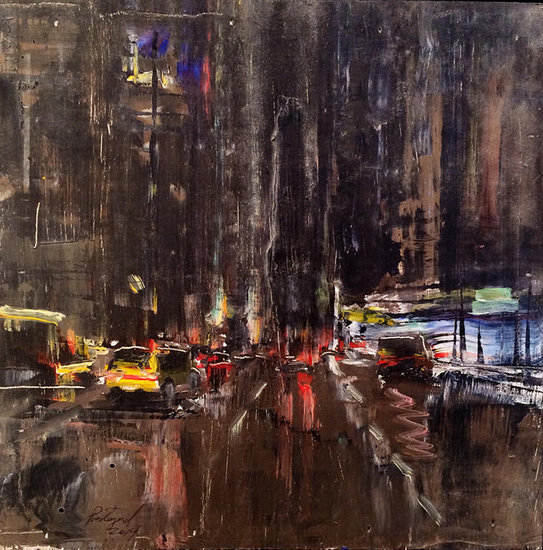
Drama in the details
While his subject matter rarely detours from the urban landscape, Prestegord makes each canvas unique–emblematic of the different time or place or day. “Night Abstraction” carries the same composition and franticness of “Night Streets,” yet each offers varied hues, shapes and rhythms. As a viewer, you almost expect repetition, but each piece surprises you with its ability to point out something you haven’t quite yet seen.
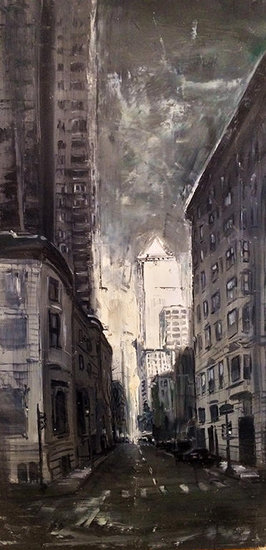
The standout of the show is “Shades of Grey,” a long, vertical work that depicts buildings of various scale flanking one concrete artery. The vantage point seems to explode in light, this tiny portion of the canvas supported by strong lines and deep charcoal hues. As with all of Prestegord’s work, the piece must be seen in person–prompting you to walk Center City looking for that exact corner.
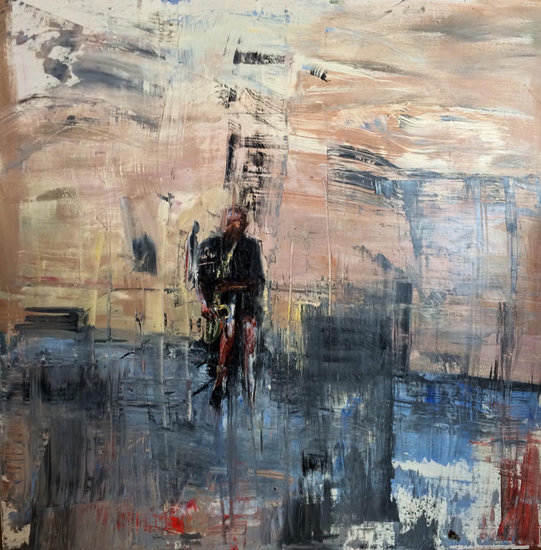
And while Prestegord excels at the formal elements of painting, he also takes a social viewpoint. He paints what is overlooked and what is on its way to being forgotten. He embraces the politics of urban decay, while reminding us of the beauty that once was. He captures the disorder, the stillness, and the fleeting. This idea rings true in the frontispiece of the exhibition, “Abstract Jazz Man,” in which a saxophone player dissolves into the rhythms of his music but also the legacies of the past.
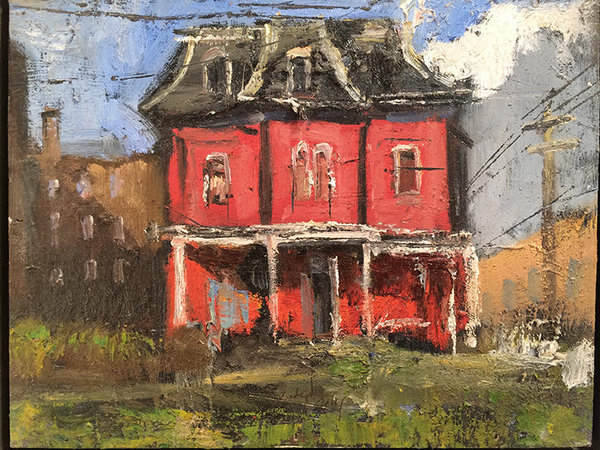
While many contemporary artists, particularly photographers and Ruin Porn enthusiasts, attempt a similar intention, Prestegord stands out. Painting the current dilapidation of Gretz Brewery or an aging mansion in North Philly in oil seems almost antithetical to the contemporary–and yet Prestegord’s pieces remind us why old media and techniques are still used. In a moment of a proliferation of artists trying perhaps too hard to be edgy, Prestegord’s celebration of the formal elements of painting is the anti-cliché. Paradoxically, his work is more progressive and more contemporary for it.
Gregory Prestegord — Recent Paintings is on view at F.A.N. Gallery through April 26, 2014.


